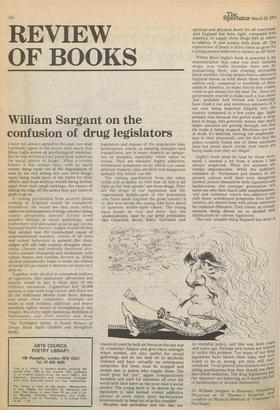REVIEW OF BOOKS
William Sargant on the confusion of drug legislators
I have not always agreed in the past, nor shall I probably agree in the future with much that Brian Inglis writes on psychological medicine. But he has written a very good book indeed on the social history of drugs*. What a terrible history it has always been, with so much money being made out of the degradation of man by the rich selling licit and illicit drugs, many being made peers of the realm for their efforts, and those without wealth being denied, apart from their small earnings, the means of taking the edge off life unless they pay taxes or graft to do so.
A visiting psychiatrist from another planet looking at England would be completely bewildered. He would see that most lethal, addictive and dangerous of drugs, alcohol, being widely advertised, literally forced down people's throats at social gatherings, sold everywhere and also taxed so as to pay for the National Health Service. Judges would tell him that alcohol was the commonest cause of unpremeditated murders, crimes of all sorts and violent behaviour in general. But many judges will still take copious draughts themselves. Chronic and mentally destroyed alcoholics number thousands and thousands, with ruined homes and families thrown in. While alcohol undoubtedly helps to make the wheels of social life go round, it destroys so many as it does so.
Together with alcohol is consumed millions of cigarettes, also intensively advertised and heavily taxed to pay a large part of the Defence estimates. Cigarettes kill 50,000 persons a year with lung cancer and there are all the additional deaths from heart disease and other chest complaints. Attempts are made to stop morphia addiction and heavy penalties rightly attach to wrongdoing in this respect. But every night numerous members of Parliament, our civil service and drug The Forbidden Game. A Social History of Drugs. Brian Inglis (Hodder and Stoughton £4.95) legislators and masses of the population take barbiturates, which, as sleeping draughts and tranquilisers, are in many respects as dangerous as morphia, especially when taken to excess. They are similarly highly addictive, withdrawal symptoms occur which can cause delirium tremens (like alcohol) and dangerous. epileptic fits, which can kill.
The visiting psychiatrist from the other world will probably be told that all this is all right as the 'best people' use these drugs. They are the drugs of our legislators and the experienced middle-aged of the population who have made England the great country it is. But woe betide the young who have dared to question middle-aged values. The young have found, by trial and error, that the amphetamines, used by our great politicians like Churchill, Bevin, Eden, Gaitskell and massively used by both air forces in the last war to counteract fatigue and give extra strength when needed, are also useful for social gatherings and do not lead on to alcoholic violence and have virtually no withdrawal symptoms. But these must be stopped and people sent to prison who supply them. The same goes for 'pot', again comparatively harmless and used for centuries all over the world with little harm as the poor man's social alcohol. The young have to be driven by our legislators to take instead violent addictive alcohol or even inject their barbiturates intravenously to keep out of police trouble!
Morphia and pethedine and the like are spiritual and physical death for all concerned. And England has been right, compared with America, to supply these drugs free at clinics to addicts. It just quietly kills them off. The expectation of death is thirty times as great for a young person addicted to opiates as off them.
Where Brian Inglis's book is powerful is his demonstration that once you start banning drugs, you really e increase their use by popularising them, and creating increasing black markets. Giving opiates free to addicts in England leaves us with about three thousand addicts only, compared to hundreds of thousands in America, so many forced into violent crime to get money for the next 'fix'. Since our government started to make such a fuss about 'pot', probably half Oxford and Cambridge have tried it out and enormous amounts of it are now being imported illegally into the country compared to a few years ago. Inglis stresses that because the police make a large haul of drugs, this generally means that much larger amounts are getting through, not that the trade is being stopped. Machines are now at work, it's believed, turning out amphetamines in their thousands, and the fact that the police recently found one of these machines does not mean much except how many are being made now they are illegal.
Inglis's book must be read by those interested. I learned a lot from it which I had always suspected. What the answers are remain imponderable. While the judiciary, members of Parliament and leaders of our present culture swill their very dangerous alcohol, poison themselves with cigarettes and barbiturates, the younger generation Will never see why their much safer amphetamines, 'pot' and `mandrax' (much less addictive and with fewer withdrawal symptoms than barbiturates), are denied them with prison sentences for repeated Offenders. They resent, as already stressed, being driven on to alcohol and barbiturates by current legislation.
The only sensible thing England has done is
—.3 its morphia policy, and this was done years and years ago. Perhaps new minds are wanted to tackle this problem. Too many of our drug legislators have blown their tops, and noW found to be so wrong, yet they still can't withdraw. Vocal general practitioners are even telling psychiatrists how they should use their, specialised sedatives. The drug legislators an,c; the 'shouters' are behaving as if much too full of barbiturates or alcohol themselves.
Dr William Sargant is Honorary Consulting, Physician at St Thomas's Hospital, and co-editor of Physical Methods of Treatment in Psychiatry


































 Previous page
Previous page